Juanda International Airport Bandar Udara Internasional Juanda | |||||||||||
|---|---|---|---|---|---|---|---|---|---|---|---|
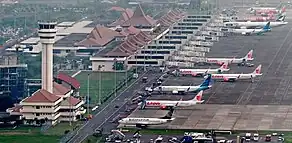 | |||||||||||
| Summary | |||||||||||
| Airport type | Public / Military | ||||||||||
| Owner | InJourney | ||||||||||
| Operator | Angkasa Pura Airports | ||||||||||
| Serves | Surabaya metropolitan area | ||||||||||
| Location | Sidoarjo, East Java, Indonesia | ||||||||||
| Opened | 7 February 1964 | ||||||||||
| Hub for | |||||||||||
| Focus city for | |||||||||||
| Time zone | WIB (UTC+07:00) | ||||||||||
| Elevation AMSL | 9 ft / 3 m | ||||||||||
| Coordinates | 07°22′47″S 112°47′13″E / 7.37972°S 112.78694°E | ||||||||||
| Website | juanda-airport.com | ||||||||||
| Maps | |||||||||||
 Java region in Indonesia | |||||||||||
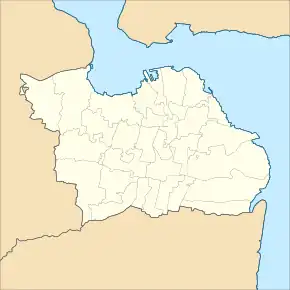 SUB Location of airport in East Java / Indonesia 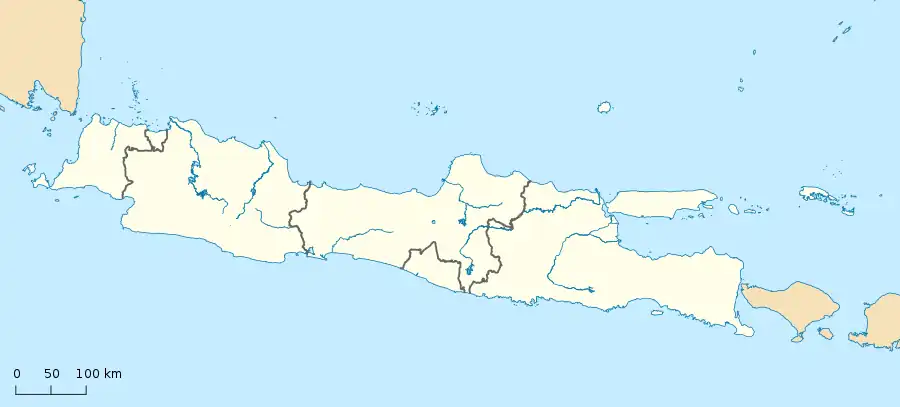 SUB SUB (Java) 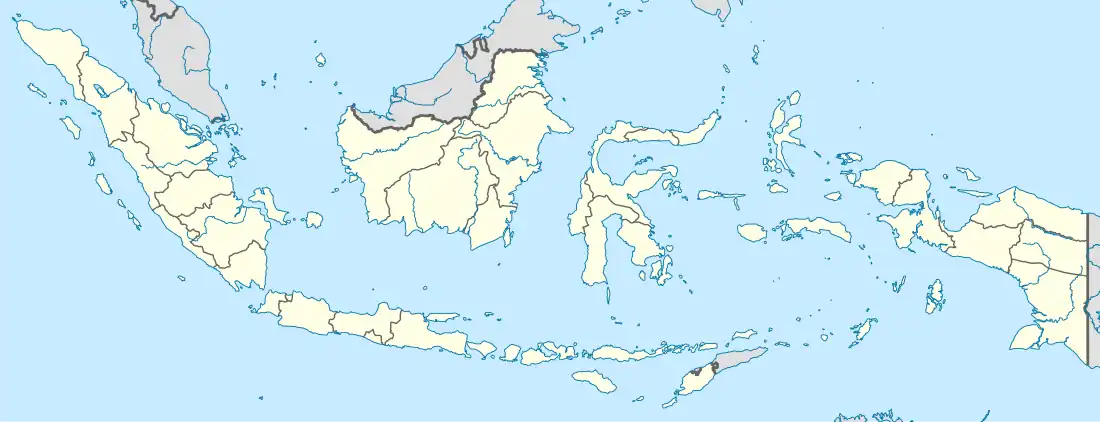 SUB SUB (Indonesia) 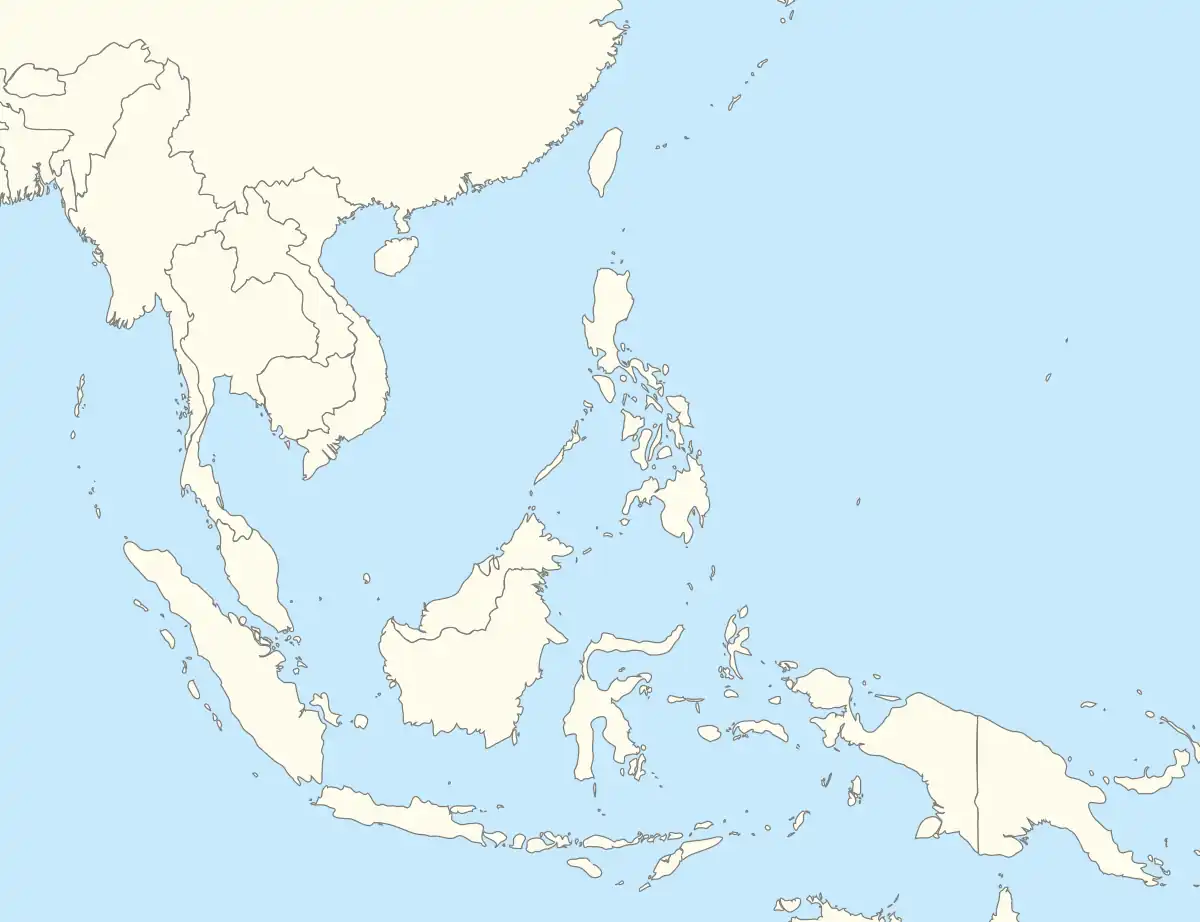 SUB SUB (Southeast Asia) | |||||||||||
| Runways | |||||||||||
| |||||||||||
| Statistics (2017) | |||||||||||
| |||||||||||
Juanda International Airport (JIA) (Indonesian: Bandar Udara Internasional Juanda) (IATA: SUB, ICAO: WARR), is an international airport located in Sedati, Sidoarjo. It is now the third busiest airport in Indonesia (after Soekarno-Hatta and Ngurah Rai airport). This airport is located approximately 12 kilometers (7.5 mi) from Downtown Surabaya and serves the Surabaya metropolitan area, the metropolitan area of Surabaya plus extended urban area. Juanda International Airport is operated by PT Angkasa Pura I. The airport takes its name after Djuanda Kartawidjaja (1911–1963), the last Prime Minister of Indonesia who had suggested development of this airport. In 2019, the airport served about 500 aircraft per day.[1]
Currently, Juanda International Airport is the hub of Citilink, Garuda Indonesia, Indonesia AirAsia, Lion Air and Sriwijaya Air along with Soekarno–Hatta International Airport. Juanda International Airport will become one of the main airports in Indonesia for ASEAN Open skies.[2]
In 2014, Juanda International Airport becomes the world's tenth best in Airport Service Quality by Airport Council International among 79 airports with passengers capacity between 5-15 million a year.[3] In Q1 2015, the airport becomes the world's seventh best in Airport Service Quality by ACI.[4]
History
Being opened on 7 February 1964 as a naval air base of Indonesia, it replaced the previous airport in Morokrembangan, near Surabaya harbor. It was originally used as home base for Indonesian Navy's fleet of Ilyushin Il-28 and Fairey Gannet. In its development it was also used for civil aviation. And PT Angkasa Pura I handled the management and operation since January 1985. On 24 December 1990 Juanda Airport was gained international airport status after the opening of the international terminal. Previously, since December 1987, the airport has served flights to Singapore, Kuala Lumpur, Hong Kong, Taipei and Manila.[5] KLM began service to Surabaya in April 1996.[6] The carrier offered flights to Amsterdam via Singapore on Boeing 747s. The route ended in February 1997.[7]
Development of airport city
On 25 February 2015, Indonesia President Joko Widodo agreed to develop Juanda Airport City, including an additional two runways and an integrated connection between Gubeng railway station and the airport via an elevated railway.[8][9] About 6,000 hectares (15,000 acres) of land have been prepared for the expansion of the airport - where in 1,500 hectares (3,700 acres) will be used to construct two additional runways, and Juanda Airport's Terminal 3, while the remaining area will be used to construct the Airport City and the Ultimate Terminal Building.[10]
The new area for Juanda Airport is estimated to be 1,700 hectares (4,200 acres) and will be located in the northern part of the airport.[11] Construction of two runways by will require the reclamation of about 4 kilometers (2.5 miles) stretch of land along Java's northern coastline. The land acquisition is expected to be completed by 2018. Development consists of three phases;
- First phase is the confirmation of the masterplan, land acquisition, reclamation for runway 2 and construction of runway 2.
- Second phase is the development of Terminal 1, reclamation for runway 3, construction of runway 3 and accessibility from toll roads and terminal.
- Third phase will be building an Ultimate Terminal and airport city supporting infrastructure.[12]
Terminals and runway
At present, Juanda International Airport has 2 terminals. A new three-story terminal building was opened in October 2006, which is now Terminal 1. The building has a capacity of eight million passengers per year and features a 51,500 square meters (554,000 square feet) domestic passenger terminal, a 20,200 square meters (217,000 square feet) international terminal and 11 aerobridges. The terminal used a mix of high hat roofs from Rumah adat Sumba as well as Java-Malay architecture themes. Terminal 1 is used for all domestic flights, except Garuda Indonesia and Indonesia AirAsia flights.
Terminal 2 was built by demolishing the old terminal building, which was opened on 14 February 2014. The architecture of T2 is modern with curved features when compared to Terminal 1. Terminal 2 has an area of 49,500 square meters (533,000 square feet) and 8 aerobridges, with a capacity to accommodate 6 million passengers per year. Terminal 2 is used for all international flights, Garuda Indonesia and Indonesia AirAsia domestic and international flights. In addition, Terminal 2 features the Garuda Indonesia Executive Lounge for domestic flights and the Concordia Premier Lounge for international flights.
The airport has separate 5,300 square meters (57,000 square feet) administration building, including a 15-story control tower, and a two-story cargo building with domestic and international cargo sections, capable of handling 120,000 metric tons (130,000 short tons) of cargo a year. The apron with an area of 148,000 square meters (1,590,000 square feet) can handle 18 aircraft simultaneously, including two wide body, 11 medium and five small aircraft. The airport has a single runway of 3,000 by 55 meters (9,843 by 180 feet). There are two 3,000 by 30 meters (9,843 by 98 feet) parallel taxiways, including five exit taxiways (30 meters (33 yards) wide) and four connecting taxiways (also 30 meters (33 yards)). The airport has a parking area of 28,900 square meters (311,000 square feet) parking area that can accommodate more than 3,000 vehicles.
Airlines and destinations
Statistics
In 2010, the airport handled 11 million passengers, although the capacity was 6 million passengers and the Air Traffic Controller radar system is only able to track 21 aircraft per hour, but at peak hour handled 40 to 45 aircraft landing and taking off.[23] The following are statistics for the airport from 1999 to 2013. In addition to this, it is noted that, in 2006, the domestic sector between Surabaya and Jakarta is the fourth-busiest air route in Asia with over 750 weekly flights.
| Year | Total passengers | Cargo (metric tons) | Aircraft movements |
|---|---|---|---|
| 1999 | 2,137,353 | 40,549 | 52,284 |
| 2000 | 2,712,074 | 31,185 | 54,154 |
| 2001 | 3,301,435 | 37,767 | 62,141 |
| 2002 | 4,746,113 | 43,089 | 75,921 |
| 2003 | 6,584,711 | 42,910 | 82,779 |
| 2004 | 8,562,747 | 63,950 | 97,421 |
| 2005 | 8,217,415 | 66,647 | 99,485 |
| 2006 | 8,986,650 | 71,574 | 91.209 |
| 2007 | 8,823,228 | 58,815 | 87,687 |
| 2008 | 9,122,196 | 62,289 | 69,726 |
| 2009 | 10,562,906 | 62,357 | 76,754 |
| 2010 | 12,072,059 | 76,774 | 84,958 |
| 2011 | 13,778,287 | 95,146 | 103,846 |
| 2012 | 16,447,912 | 102,133 | 141,365 |
| 2013 | 17,683,955 | 121,935 | 155,421 |
| 2014 | 18,071,633 | 92,439 | 117,825 |
| 2015 | 18,911,256 | 130,398 | 166,208 |
| 2019 (Estimated) | 23,545,640 | 154,544 | 173,232 |
Source : PT (persero) ANGKASA PURA 1 (in Indonesian)
Ground transport
Juanda Airport is connected to Waru-Juanda Toll Road to Surabaya, which is about 15 kilometers (9.3 miles) from the airport. DAMRI buses are provided by the local government to deliver passengers to Surabaya. Fixed tariff taxis are available to various destinations in Surabaya and surrounding areas including Malang, Blitar, Jember, and Tulungagung.
Accidents and incidents
- On 21 February 2007, Adam Air Flight 172 flying from Jakarta to Surabaya with registration PK-KKV (c/n 27284) had a hard landing at this airport, resulting in structural failure of the aircraft.[24]
- On 13 April 2010, Cathay Pacific Flight 780 from Juanda International Airport to Hong Kong International Airport landed safely after both engines failed due to contaminated fuel uploaded at the airport. 57 passengers were injured. The two pilots later received the Polaris Award from the International Federation of Air Line Pilots' Associations for their heroism and airmanship.[25]
- On 1 February 2014, Lion Air Flight 361, a Boeing 737-900ER (registration PK-LFH) from Balikpapan Sultan Aji Muhammad Sulaiman Airport to Juanda International Airport landed hard and bounced four times on the runway, causing a tail strike and substantial damage to the plane. There were no fatalities, but two passengers were seriously injured and three others had minor injuries.[26]
- On 28 December 2014, Indonesia AirAsia Flight 8501, an Airbus A320-216 registered PK-AXC (MSN 3648) with 155 passengers and 7 crew on board, crashed into the Java Sea whilst en route from Juanda International Airport to Changi International Airport, Singapore, killing all 162 on board. Regulatory licenses for the Surabaya-Singapore route as well as Medan-Palembang route have been suspended for Indonesia AirAsia since January 2015 due to suspected licensing breaches; the Medan-Palembang route had been resumed, however.
Gallery
 Terminal 1 - 2nd Floor
Terminal 1 - 2nd Floor A Cathay Pacific Airbus A330-300 at Juanda
A Cathay Pacific Airbus A330-300 at Juanda On the apron, Saudi Airlines Boeing 747-300 refueling and reloading to serve Indonesian Hajj pilgrims to Mecca.
On the apron, Saudi Airlines Boeing 747-300 refueling and reloading to serve Indonesian Hajj pilgrims to Mecca.
Notes
- ↑ Garuda Indonesia flight from Surabaya to Jeddah includes a stop-over at Banda Aceh. Garuda Indonesia does not have rights to transport passengers solely between Surabaya and Banda Aceh, however.
- ↑ Garuda Indonesia flight from Surabaya to Medina includes a stop-over at Banda Aceh. Garuda Indonesia does not have rights to transport passengers solely between Surabaya and Banda Aceh, however.
References
- ↑ "Soekarwo : Bandara Juanda Butuh Double Runway". Surabaya.tribunnews.com. 9 January 2014.
- ↑ "Kemenhub; Lima Bandara Disiapkan Untuk Asean Open Sky". Beritatrans.com. Retrieved 19 May 2016.
- ↑ Feby Dwi Sutianto (24 April 2015). "Layanan Bandara Ngurah Rai Terbaik No.7 Dunia". Finance.detik.com.
- ↑ "Bandara Ngurah Rai Peringkat Ketiga Terbaik Dunia". Beritasatu.com. 6 June 2015. Archived from the original on 8 June 2015. Retrieved 9 June 2015.
- ↑ "Juanda International Airport, Indonesia". Airport-technology.com. Retrieved 29 April 2015.
- ↑ Campbell, Al (30 April 1996). "KLM to launch China flights". South China Morning Post. Retrieved 20 January 2023.
- ↑ "KLM Airlines to end Surabaya, Bali service". The Jakarta Post. 14 February 1997.
- ↑ "Presiden Jokowi Setujui Proyek Juanda Airport City". Surabaya.tribunnews.com. 26 February 2015.
- ↑ "Presiden Jokowi Setujui Proyek Juanda Airport City". Surabaya.tribunnews.com. 26 February 2015.
- ↑ "Surabaya to Reclaim Northern Coastline to Expand Juanda Airport". Tempo. Retrieved 27 December 2017.
- ↑ "PT Angkasa Pura I to improve Juanda International Airport". The Jakarta Post. Retrieved 27 December 2017.
- ↑ "Juanda Airport to Build Terminal III, New Runway". Tempo. Retrieved 27 December 2017.
- ↑ "Awal September, Batik Air Siap Layani Rute Berau-Jakarta dan Berau-Surabaya". Kaltimtoday (in Indonesian). 12 August 2023. Retrieved 22 August 2023.
- ↑ "Batik Air (Indonesia) to launch Surabaya-Singapore service". CAPA. 13 September 2022.
- ↑ "8 Maret, Citilink Operasikan Rute Penerbangan Surabaya-Jeddah". Indo-Aviation.com. Archived from the original on 20 February 2016. Retrieved 19 May 2016.
- ↑ "Best Fare Pontianak". www.citilink.co.id. Archived from the original on 21 March 2020. Retrieved 21 March 2020.
- ↑ Putra, Idris Rusadi. "Garuda Indonesia resmikan penerbangan langsung Surabaya-Madinah". Merdeka.com. Retrieved 27 December 2018.
- ↑ "AirAsia Buka Rute Baru Surabaya-Johor Bahru". detikTravel.
- ↑ "INDONESIA AIRASIA ADDS SURABAYA – SINGAPORE SERVICE IN NS23". Aeroroutes. 21 March 2023. Retrieved 21 March 2023.
- 1 2 3 4 5 "Awal 2024, Lion Air Buka Rute Baru Langsung dari Surabaya ke 5 Kota Tujuan di Indonesia". bisnis.tempo.co. Retrieved 27 December 2023.
- ↑ "MULAI 23 AGUSTUS 2023 SUPER AIR JET TERBANG LANGSUNG KE KUALA LUMPUR DARI LOMBOK DAN SURABAYA". agent.lionair.co.id. 1 August 2023.
- ↑ "Super Air Jet on Instagram: "Halo Supers, per 14 Oktober, #SuperAirJet membuka rute baru dari Surabaya ke Kupang. Kira-kira kalau Tim & Kru #SuperAirJet ke #Kupang bagusnya kemana dan makan apa? Ada yang punya rekomendasi?"".
- ↑ "Major RI airports bursting at the seams: Inaca". The Jakarta Post. 29 July 2011. Retrieved 19 May 2016.
- ↑ "Crash follows safety concerns". The Daily Telegraph. 7 March 2007. Retrieved 4 February 2014.
- ↑ "Pilots reveal death-defying ordeal as engines failed on approach to Chek Lap Kok". South China Morning Post. 20 April 2014. Retrieved 21 April 2014.
- ↑ "Lion Air Flight JT 361". Aviation-safety.net. Retrieved 16 April 2014.
External links
- PT. Angkasa Pura I: Juanda Airport (in English)
- Juanda International Airport website
- Accident history for SUB at Aviation Safety Network